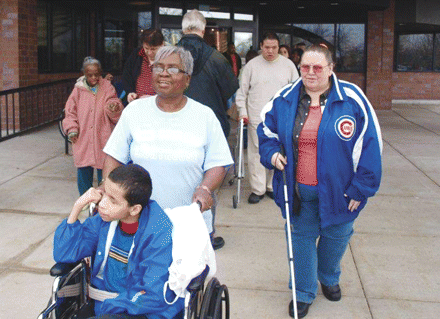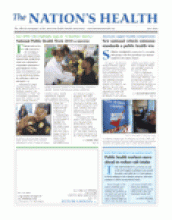From health walks and preventive screenings to lectures and campus forums, National Public Health Week events were celebrated in communities nationwide in April. Hundreds of observances were held from coast to coast and beyond during the celebration, which was held April 5–11.
Organized by APHA, National Public Health Week 2010 focused on “A Healthier America: One Community at a Time” and encouraged communities across the country to commit to making America a healthier nation. Health departments, organizations, students and everyday Americans took up the charge and shared it in their neighborhoods, campuses and communities.

In Detroit, one of the many National Public Health Week events included information on how to adopt an animal.
“National Public Health Week is an opportunity to highlight the important role that public health plays in Americans’ lives and to engage people in improving the health of their communities,” said APHA Executive Director Georges C. Benjamin, MD, FACP, FACEP (E). “I am thankful that so many nationwide took time to advance public health during this year’s event, whether they were taking those first, small steps or instituting big changes.”

Health professional students in Santo Domingo, Dominican Republic, measure blood pressure during a health fair.
In keeping with the theme of the event, APHA used National Public Health Week 2010 to launch its new online video, “A Healthier America.” The video, which can be viewed and shared via the National Public Health Week website, showcases the message that “a healthier America begins with you,” with suggestions on how viewers can make changes in their communities. Public health supporters were encouraged to view the video and pass it along to their friends, family and colleagues. As of May, the video had received more than 20,000 views.
APHA also released the results of a nationwide poll during National Public Health Week that found Americans are making positive changes to improve their health and are willing to make even more to improve the health of their communities. The survey, which sampled more than 1,000 people by phone, found that 64 percent of Americans have made healthy changes in their lifestyles and 21 percent are thinking about making additional improvements. The survey also found that 51 percent of Americans have helped their friends or families make changes to their personal health and well-being in the past six months.
“Healthy behavior is contagious and it begins with each of us,” Benjamin said. “If every American took just a few small steps towards a healthier lifestyle, the next generation could quite possibly be the healthiest in the world.”
APHA was not the only national leader to draw attention to National Public Health Week. At the federal level, U.S. Sen. Tom Udall, D-N.M., and U.S. Rep. Lucille Roybal-Allard, D-Calif., introduced resolutions in Congress recognizing the importance of the week, which serves “as an important reminder for individuals, families and communities to focus on stopping preventable diseases before they start,” according to Udall.
“We can no longer ignore the science that links nearly 60 percent of premature deaths in our country to unhealthy behavioral choices, as well as environmental conditions and social circumstances,” Roybal-Allard said. “National Public Health Week is a call to action. I urge everyone to learn more about the small, yet crucial, behavioral changes that we can make to prevent chronic diseases…In our homes, schools and in our communities, we all have an important role to play in the effort to achieve healthier futures for all of us.”
Additionally at the federal level, President Barack Obama sent a National Public Health Week message to APHA, noting that “if we each make investments in our individual health, we will contribute to the long-term wellness of our citizens, our economy and our nation.”
“During National Public Health Week, we recommit to laying a new foundation for a stronger, healthier America and a brighter tomorrow for all,” Obama wrote.
The U.S. Department of Health and Human Services also played a role in National Public Health Week, with HHS Secretary Kathleen Sebelius keynoting a National Public Health Week briefing sponsored by APHA on Capitol Hill. Additionally, Assistant Secretary for Health Howard Koh, MD, MPH, issued an HHS statement drawing attention to the “almost-inseparable bond linking healthy individuals and healthy communities to a healthy nation.”

HHS Secretary Kathleen Sebelius speaks at the Capitol Hill event.
Photo by Kim Krisberg
Public health professionals were encouraged to make advocacy a key component of their National Public Health Week celebrations. At the national level, APHA created a series of advocacy messages on issues such as transportation and nutrition that were sent to members of Congress. More than 1,000 messages of support were sent during the week by APHA members and health advocates.
For the first time, National Public Health Week included Public Health Student Day, which was held on Friday, April 9. The observance, which is expected to become an annual event, drew attention to the important contributions that public health students bring to the field.
APHA used social media to spread the National Public Health Week message through tools such as Twitter, Facebook and LinkedIn. Followers, fans and friends were encouraged to repost and share the information and show their support. They were also asked to take a pledge to become a health champion and commit to making a change for the health of their communities.

Chicago Lighthouse staff, shown on a group walk with program participants, submitted their event news to The Nation’s Health.
Photo by Peg Meller, courtesy Chicago Lighthouse
This year’s National Public Health Week sponsor was the Centers for Disease Control and Prevention, and more than 140 national, state and local organizations and agencies signed up to become National Public Health Week partners. In addition, more than 230 events were posted to the event calendar.
National Public Health Week supporters were invited to share their events with The Nation’s Health. Many responded, submitting photos, proclamations, fliers, posters and other materials showcasing their activities. (See Page 19.)
Event organizers are also encouraged to share their National Public Health Week photos in the APHA Flickr pool, online at www.flickr.com/groups/aphapublichealth.
National Public Health Week 2011 will be observed April 4–10. The theme of next year’s observance will be announced by the November APHA Annual Meeting. Check the National Public Health Week website, www.nphw.org, for updates.
For more information on National Public Health Week, visit the event website at www.nphw.org, call 202-777-2425 or e-mail nphw{at}apha.org.
- Copyright The Nation’s Health, American Public Health Association









